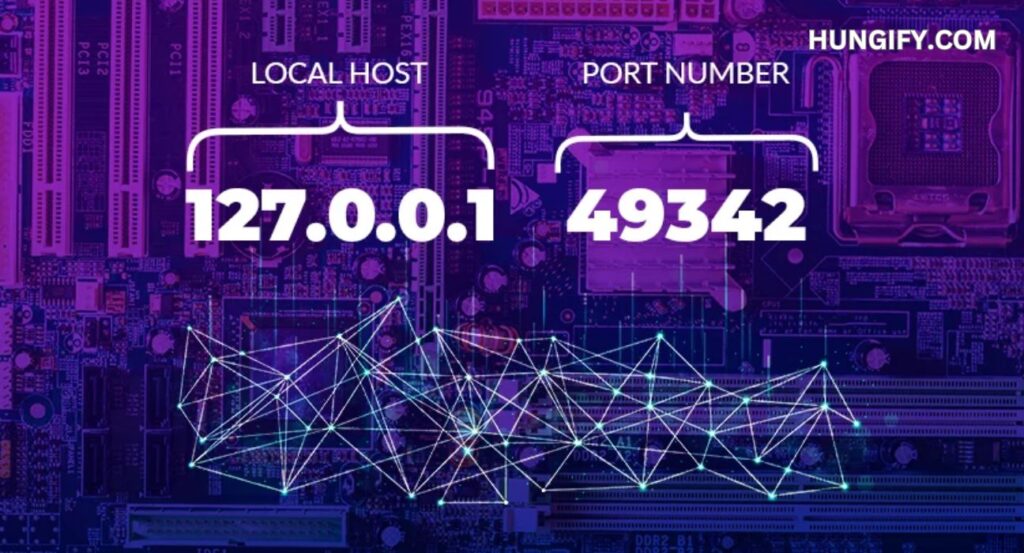Introduction
The IP address 127.0.0.1:49342 is an essential tool in networking and software development. Often referred to as the “localhost” or “loopback” address, 127.0.0.1:49342 enables communication within a single machine. This guide will explore its significance, uses, and setup, making it easy to understand for both beginners and experienced users.
Read More: Moving :wkyidcuim8w= Gif Wallpaper :Comprehensive Guide
What is 127.0.0.1?
127.0.0.1 is a special IP address that refers to the local machine itself. Developers commonly use 127.0.0.1:49342 for testing and development, allowing them to simulate network conditions without needing external connections. This address, paired with a port number like 49342, helps direct traffic to specific applications running on the local machine.
The Historical Background of 127.0.0.1 and Its Evolution
The IP address 127.0.0.1 has been a fundamental part of computer networking since the early days of the internet. Originally designated as a loopback address, it allows a device to communicate with itself, making it essential for testing and diagnostics. Over time, its use has expanded from simple connectivity checks to more complex applications in development environments. Understanding its history helps in appreciating its current versatility and continued relevance.
Understanding Port 49342
127.0.0.1 uses port 49342 as a dynamic port in conjunction with its operations. This combination allows different services and applications on the same device to communicate effectively. Port numbers, like 49342, are essential in distinguishing different processes and ensuring seamless network communication.
Setting Up 127.0.0.1:49342
To use 127.0.0.1:49342, you’ll need to set up a local server. Start by installing server software like Nginx, Apache, or IIS on your machine. Configure the server to listen on port 49342, enabling it to accept incoming connections. Tools like Docker or VirtualBox can also help manage virtual environments, allowing for more complex testing scenarios.
Common Uses of 127.0.0.1:49342
127.0.0.1:49342 is widely used in local development and testing. Developers can test applications and APIs locally without affecting live systems. This setup is also useful for isolated network conditions, allowing simulations of various scenarios without external interference.
Security Considerations
Using 127.0.0.1:49342 provides a safe environment for testing, but it’s crucial to implement security measures. Ensure your server configurations are secure, and consider using VPNs for added protection. Regularly update your system and server software to protect against vulnerabilities.
Troubleshooting Common Issues
When using 127.0.0.1:49342, you may encounter issues like connection problems or port conflicts. To troubleshoot, check your server configuration and verify that your machine’s TCP/IP settings allow communication on port 49342. Use tools like Telnet or Curl to test connectivity, and review server logs for error messages.
Advantages of Using 127.0.0.1:49342
The benefits of using 127.0.0.1:49342 include a secure testing environment, ease of debugging, and isolation from external networks. It allows developers to troubleshoot issues and test applications thoroughly before deployment, ensuring stability and security.
Using 127.0.0.1:49342 for API Development
127.0.0.1:49342 is ideal for developing and testing APIs locally. Developers can use this setup to simulate real-world scenarios and test API endpoints without exposing them to the public internet. This ensures that all functions work correctly before deployment.
Role of 127.0.0.1:49342 in Educational Settings
In educational environments, 127.0.0.1:49342 serves as a valuable tool for teaching network concepts. Students can learn about IP addresses, port numbers, and local server setups without needing external internet access. This practical experience helps solidify theoretical knowledge.
Practical Examples of 127.0.0.1:49342 in Action
Practical applications of 127.0.0.1:49342 include local website hosting and software testing. Developers can host web pages on their local machine, accessible only via 127.0.0.1:49342. This setup allows for thorough testing and debugging before going live.
Monitoring and Logging with 127.0.0.1:49342
Using 127.0.0.1:49342, developers can implement monitoring and logging systems to track application performance. By analyzing logs, they can identify issues such as slow response times or errors, enabling quick resolution and optimization.

Future Trends and Innovations in Using 127.0.0.1:49342
The use of 127.0.0.1:49342 is evolving with technological advancements. With the rise of containerization and microservices, this localhost setup will continue to play a crucial role. Future developments may include enhanced tools for more secure and efficient local testing environments.
Common Misconceptions About 127.0.0.1:49342
Many people misunderstand the role and capabilities of 127.0.0.1:49342. People often mistakenly believe that 127.0.0.1 can connect to the internet, but it is actually a loopback address used solely for internal communication. Another myth is that it is less secure, but with proper configuration, it can be a safe environment for testing and development. This section clarifies these points and dispels other myths.
Best Practices for Configuring 127.0.0.1:49342
Setting up 127.0.0.1:49342 requires careful configuration to ensure it is secure and efficient. Best practices include using strong authentication methods, regularly updating server software, and correctly setting permissions to prevent unauthorized access. Additionally, developers should monitor server logs for any anomalies and use firewalls to control access. Following these guidelines helps maintain a secure and functional local testing environment.
Differences Between 127.0.0.1:49342 and Other Localhost Ports
127.0.0.1 commonly associates with localhost, but different ports like 49342 or 80 serve specific purposes. Port 80 typically handles HTTP traffic, making it standard for web servers. In contrast, 49342 may be used for specific development tasks, such as testing APIs or applications in a controlled environment. Understanding these differences allows developers to choose the right setup for their needs.
Advanced Uses of 127.0.0.1:49342 in Development
You can use 127.0.0.1:49342 in advanced development scenarios beyond basic testing. For example, it facilitates the creation of virtual environments where you can test different versions of applications simultaneously. It also supports complex CI/CD pipelines, enabling the simulation of automated testing and deployment processes. This flexibility makes it invaluable for sophisticated development workflows.
127.0.0.1:49342 in Modern Cloud and Container Environments
In the era of cloud computing and containerization, 127.0.0.1:49342 remains a vital tool. It helps developers simulate cloud environments locally, enabling them to test containerized applications before deploying them to platforms like Kubernetes. This local testing ensures that the applications will function correctly in their final cloud environments, reducing the risk of deployment issues.
The Future of Localhost Usage: Emerging Trends and Innovations
The future of 127.0.0.1:49342 is likely to be shaped by emerging technologies such as the Internet of Things (IoT) and edge computing. As more devices require local processing capabilities, the demand for efficient and secure localhost configurations will grow.
Conclusion
127.0.0.1:49342 is an invaluable tool in networking and software development. It provides a controlled environment for testing and development, making it easier to identify and resolve issues. Understanding how to use and secure 127.0.0.1:49342 is essential for efficient and safe local operations. As technology evolves, so will the uses and significance of localhost and its associated ports.
Read More: Clipart :xylwx-Crhfu= Christmas: A Comprehensive Guide
Frequently Asked questions
What is 127.0.0.1:49342?
127.0.0.1:49342 is an IP address and port number combination used for local communication within a device, often for testing and development purposes.
Why is 127.0.0.1:49342 called a localhost address?
127.0.0.1 is called a localhost address because it refers to the local machine itself, allowing it to send messages back to itself for testing.
How does 127.0.0.1:49342 work in testing environments?
It allows developers to run and test applications locally without external network access, ensuring that changes do not affect live systems.
Can 127.0.0.1:49342 be used to access external websites?
No, 127.0.0.1:49342 only accesses the local machine and cannot be used to connect to external websites or servers.
What types of applications use 127.0.0.1:49342?
Applications like web servers, APIs, and network services use 127.0.0.1:49342 for local testing and development.
Is 127.0.0.1:49342 secure for testing purposes?
Yes, it is secure as long as proper security measures are implemented, such as firewalls and secure server configurations.
How do I configure 127.0.0.1:49342 on my machine?
You configure it by installing server software like Nginx or Apache and setting the software to listen on port 49342.
What are the benefits of using 127.0.0.1:49342 for development?
It offers a controlled environment for testing, reduces dependency on external networks, and helps isolate bugs and issues.
Can multiple applications use 127.0.0.1:49342 simultaneously?
Yes, multiple applications can use different ports on 127.0.0.1, but conflicts can arise if the same port is used by more than one application.
What are common issues when using 127.0.0.1:49342, and how can I resolve them?
Common issues include port conflicts and configuration errors. You can resolve them by checking server settings, ensuring the port is not blocked, and verifying firewall configurations.
